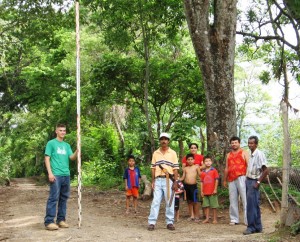An open faucet | Source/complete article: Frank Bergh, Contributing Editor, Engineering for Change News, Jan 4, 2014.
Excerpts – High in the mountains of El Salvador in Central America there is a village called Solemán. This outcropping of only 20 houses is small, but it offers a profound example of the technical humanitarian challenges of the future.
….
At night, when electricity is cheapest, Solemán runs the pump until the tank is full. Each morning at 6:00 a.m. someone opens the valves to allow water to flow to each household’s faucet tap. Invariably the tank is empty by 6:30 a.m. At first I was surprised to see that these families consumed thousands of gallons of water in only 30 minutes, but then I was told that most households don’t use their share of the water even over the course of 48 hours. It’s just that no one had ever turned off their faucet.

The author, Frank Bergh (left), surveys for a water distribution system in the Salvadoran village Mariñon, which neighbors Solemán. Photo by Andrea Heugatter
Each family’s faucet pours their morning water supply into a pila. When I asked one woman in Solemán, Mama Hilda, why she never closed her water faucet, she replied that the neighbors would not close theirs, so her family would be the only one without water. Without any assurance of the neighbors’ behavior, no household dared to shut off its faucet. Regardless of the sophistication of their water distribution system, these people had each chosen to forego the benefits of running water simply out of mutual distrust.
I visited Solemán in May 2006 with a team of Engineers Without Borders-USA as we surveyed the land to prepare for the design of an analogous system in the village of Mariñon. This story and the image of an open faucet is so vivid to me, because I believe it is emblematic of the challenges to be faced in the fight against poverty around the world.
The spirit of the village of Solemán, that they rallied together to build the tank and lay the pipe side-by-side with neighbors, gives me so much hope. However, their urge to stockpile the water rather than share it reminds me that collectively, we still have a long way to go. The technical know-how for a brighter and more peaceful future is available today. So much of the injustice and strife in our world is only a matter of inadequate distribution. Whether the problem is wealth versus poverty, surrounded versus lonely, oppressor versus oppressed, obesity versus hunger, farmstead versus slum… all stem from a tendency to accumulate rather than distribute.
- Source/complete article: Frank Bergh, Contributing Editor, Engineering for Change News, Jan 4, 2014.



